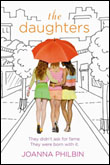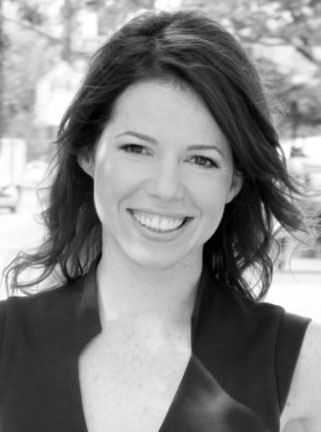 With a famous TV personality for a father, it's not hard to imagine what prompted Joanna Philbin to pen her debut novel, THE DAUGHTERS --- which offers a rare peek at life in the spotlight from the unique perspective of celebrity children. However, in today's guest blog, she reveals the far more personal source of inspiration behind her main character, Lizzie, and the questions her protagonist asks about the true meaning of beauty.
With a famous TV personality for a father, it's not hard to imagine what prompted Joanna Philbin to pen her debut novel, THE DAUGHTERS --- which offers a rare peek at life in the spotlight from the unique perspective of celebrity children. However, in today's guest blog, she reveals the far more personal source of inspiration behind her main character, Lizzie, and the questions her protagonist asks about the true meaning of beauty.
When I was a teenager, I went to an all-girls’ high school. There were definite perks to this. For one, nobody had to care about looking good. We got up in the morning, washed our faces, threw on our dark-green plaid kilts, and ran out the door. With no boys waiting for us in the classroom, it didn’t matter that some of us forgot to brush our hair or put on lipstick. School was a makeup and blowdryer-free zone, and I loved it that way.
But even though I didn’t have to worry about what a guy thought of my looks, I worried about them, anyway. Because my friends, you see, were gorgeous. One had sparkling blue eyes and glacial cheekbones. Another had flawless olive skin that never saw a pimple. Another had enviably thick, wavy hair that looked perfect cascading over her shoulders or whisked up into a knot and secured with a pencil. They were beautiful without even having to try. But I was a different story. If I wanted to look pretty, I needed to work at it. I didn’t have a standout feature. My hair wasn’t wavy or thick or even long. My skin wasn’t flawless. In my mind, I looked nothing like these girls, who seemed Vogue-worthy from the moment they rolled out of bed. At home, I would look in the mirror and sigh dramatically. Face it, Philbin, I’d think. You’re just…well…ordinary.
Needless to say, I’m a little embarrassed to admit this now. But I will never forget those feelings, and they served me well while writing my first book, THE DAUGHTERS. The lead character, Lizzie Summers, is embarrassed that she doesn’t look like her supermodel mom. Or, for that matter, like her best friends, beachy-blond Carina and stylish, alluring Hudson. Lizzie is tall, long-limbed, with wild red hair and large, asymmetrical features, but she longs to look different --- to be what she considers “beautiful.” When she meets a photographer who actually does think she’s beautiful, Lizzie is thrown into confusion –-- what, after all, does that word even mean?
Lately, I’ve been asking myself the same question. What did it mean to be beautiful when I was Lizzie’s age? It didn’t necessarily mean having a boyfriend --- boys were in short supply on the Upper East Side. Actually, I think it had something to do with success. I think I believed that my beautiful friends would end up living a different kind of life than me. They would never be lonely. They would always have fabulous clothes. They would live a life full of travel and intrigue and romance, while I, and the rest of the ordinary-looking folks, would be relegated to a dead-end job, where I’d sit in a cubicle somewhere, clipping coupons, alone.
I turned out to be wrong about this. Twenty years later, I know that beauty doesn’t equal success. Hard work does. But when we are slowly becoming our adult selves, and there is so much that is still unknown about our futures, it’s easy to assume that the commercials and magazine ads know better --- that it is the people with straight noses and thick hair and small waists who turn out to hold the keys to the good life. Why wouldn’t we think that, when these are the only people we see getting to live the good life? Fortunately, that is changing, a little. Images of real women and real bodies have been popping up in print ads and commercials. Even celebrities are asking not to be Photoshopped. But I know that on certain days, when I look in the mirror, I am fourteen all over again, and wondering why I can’t look different.
As a girl, wanting to look good is in my DNA. Something primal inside of me rises up whenever I walk into the cosmetics department at Saks. I think, If only I get this foundation, maybe, just maybe, I’ll finally be the person I know I can be! But then I remind my fourteen year-old self that I know better. Somehow, I got to that place anyway. And it had nothing to do with foundation.
-- Joanna Philbin



